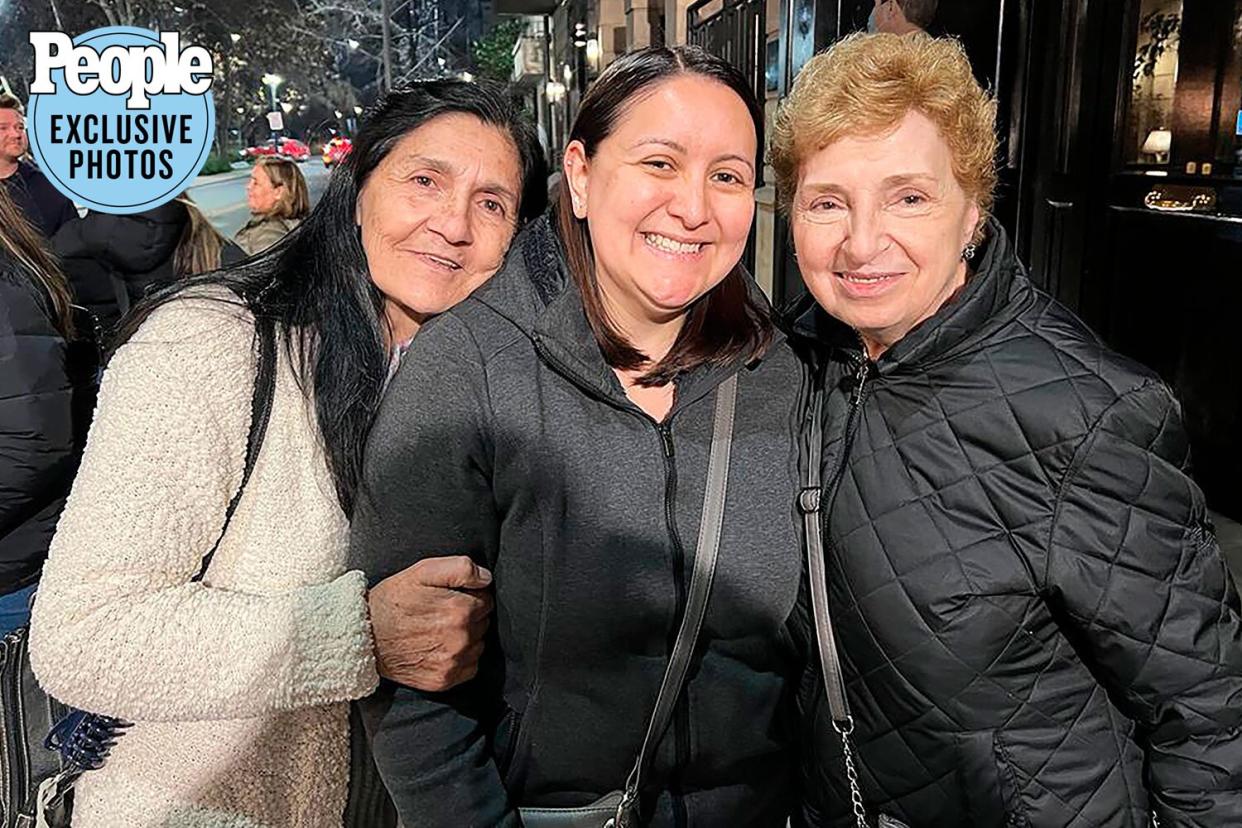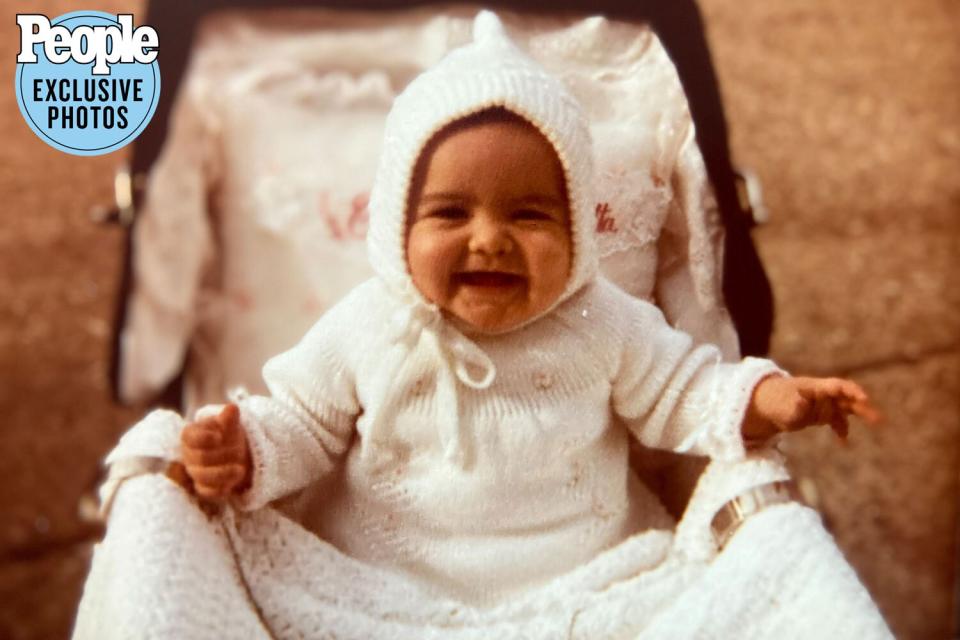Mom Says Daughter Is 'Whole Now' After Meeting Chilean Birth Mother from Whom She Was Stolen

Cristina Prisco (center) with her biological mother (left) and her adoptive mom, Ann Marie Zagaglia, in Chile in July.
Ann Marie Zagaglia recalls noticing a certain sadness in the daughter that she and her husband adopted from Chile in 1980 and raised as an only child in their Italian-American family in the Bronx.
"I used to tell Cristina when she reached a certain age, 'You have a void in you. And nothing can fill it, no matter what we try to do.'" Zagaglia, 73, tells PEOPLE in this week's issue. "At the time, I couldn't understand it."
Earlier this year, Zagaglia and her daughter, Cristina Prisco, 42, were shocked to learn the answer to the mystery: Prisco, it turned out, had been one of thousands of babies stolen from their parents in Chile in the 1970s and '80s under the brutal regime of General Augusto Pinochet, who presented the scheme as a means of reducing poverty.
Through the help of the non-profit Connecting Roots, started by fellow Chilean adoptee Tyler Graf, and MyHeritage DNA kits that confirmed a match, Prisco was able to find her birth mother — and discovered she has eight biological siblings. In July, she and Zagaglia traveled to Chile to meet her biological family. "When I learned the truth, I was heartbroken," Zagaglia says. "And when Cristina told me she's got all these siblings, I almost dropped dead. Here she was, a lonely only child. I was very angry. I knew, obviously, we were used."
When Zagaglia, a teacher and the daughter of Italian immigrants, and her husband Benito, a master carpenter who emigrated from Italy, decided to adopt, they hoped it would be an answer to a prayer. Years earlier, they tried to have a child, but Zagaglia suffered two miscarriages. During the second, "I almost hemorrhaged to death," she says. "My husband just could not bear the thought of trying again. And I told the doctor I did not want to feel a baby kick inside of me and then lose that child. I didn't think I could bear that."
So, through a social worker in New York, the couple learned of a Catholic priest from Italy who ran an orphanage in Chile. They filled out an application, and when the priest came to New York on a visit, they met and bonded over their faith and their common native land. "He said not to worry, we were definitely going to get a baby from him," Zagaglia says. "It only took about nine months and we got a phone call from the orphanage." The couple were told that Cristina's mother was young and uneducated and had decided she couldn't provide for her child.
For more stories on remarkable adoptees who were stolen at birth in Chile, pick up the latest issue of PEOPLE, on newsstands Friday, or subscribe here.
Her husband traveled to Chile, bringing with him 50 lbs. of baby supplies that the orphanage requested. "Diapers, powder formula, baby clothes," Zagaglia recalls. "I did not find out until I went down there with Cristina at the end of July that those babies were never given any of it. They sold it all."
Cristina cried the entire long flight back home with her adoptive father. "When I unwrapped her at home, I was shocked," Zagaglia says. "The formula they'd given her was nothing more than sugar water and the skin on her back was onion thin and purple." At three and a half months, Cristina weighed only eight lbs.: "Our doctor told us that one more week and she would've died of dehydration."

Cristina Prisco in 1980, after her adoption from Chile.
Until this spring, Zagaglia believed that she and her husband, who died in 2015, had saved their daughter from a life of poverty and neglect in a Chilean orphanage. Then, on April 11, Cristina, who now lives in Westchester County, New York, was on spring break from her job as a data manager for a school district and turned on her TV to watch Good Morning America. The show was airing an interview with Tyler Graf, who had discovered that he been taken from his Chilean mother as an infant before being adopted by a couple in Minnesota, and his story sounded eerily familiar.
That evening, Prisco was able to get in touch with Graf through Connecting Roots, and by the end of the week, he had found her family and set up a video call with her biological mother and siblings. "I could see the resemblance instantly — my sisters, especially," Prisco says. "I could also see the similarities to my mother: the dark hair, the dark eyes. There was no doubt that this was my family."
On that call, they learned that Cristina had been taken from her Chilean mother the day after her birth after the hospital falsely said she needed to be treated for jaundice. When her mother returned to visit, the baby was gone. In tears, she found a social worker at the hospital "but the woman said to her, 'I don't know why you're crying. You gave your baby up for adoption,'" Prisco says. "And my mother says, 'What are you talking about? I never consented to that.' And then she lost it."
Alone and upset and unsure what to do, her mother was physically thrown out of the hospital. "She wanted to search for me, but she had three young children at home and no money and no one to help," Prisco says. "She said she thought of me every day. I have two children and I couldn't imagine what that must have been like — the pain she felt, not knowing where her child was and if she was okay. As we listened, me and my adopted mom were sitting in shock."
Around Mother's Day, one of Graf's Chilean friends brought a MyHeritage DNA test to her birth mother in Chile (Prisco had already uploaded her DNA into the company's family history system) and the results confirmed what she already felt to be true. She and Zagaglia made plans to visit Chile in July.
When they arrived at the airport in Chile, "I was nervous because I didn't know where I would stand," Zagaglia says. "Am I the person who took this child away all these years? I didn't know if they would resent that I had her for 42 years, or if it would be okay."
The entire family welcomed both women with open arms. "Cristina's brother had made a beautiful sign reading 'Welcome home, sister.' And she took off running," Zagaglia says. "Everybody hugged me too. To me, that was another miracle, that I became part of their family from the minute they saw me."
That moment "felt like I was born again. It was the greatest day," says Prisco, who now volunteers with Connecting Roots, helping other families reunite. Says Zagaglia, "I told her, 'This is what the void was. You are whole now. That emptiness is finally filled."

 Yahoo News
Yahoo News 
